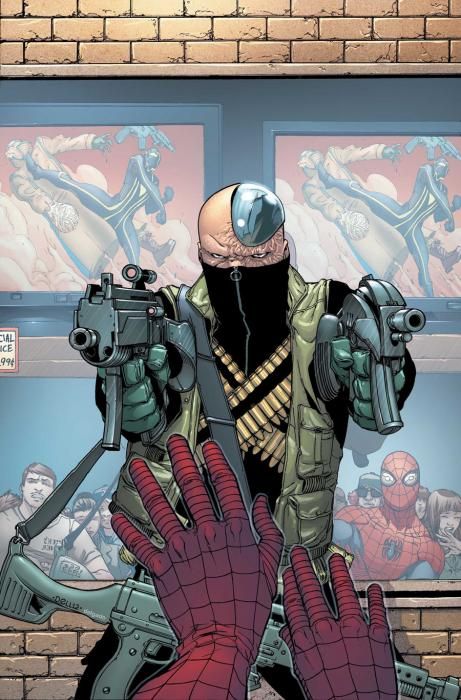In "Superior Spider-Man" #4, Dan Slott and Giuseppe Camuncoli move the action of the story in three different directions, each deepening the plot or characterization. Doc Ock's visit to Aunt May and his actions afterwards show that he takes the personal as seriously as the professional. Despite giving up his pursuit of Mary Jane, he is still intent on living out Peter Parker's life as well as Spider-Man's. In the second half of the issue, Slott lays the groundwork for Superior Spider-Man to face his first serious villain, Massacre. The ending cliffhanger brings in another long-time member of Spider-Man's rogue's gallery, and this tidbit carries with it a reminder of the larger threat of discovery that Doc Ock still faces.
Villains and heroes, especially long-time opponents like Spider-Man and Doc Ock, have a peculiar intimacy. In "Superior Spider-Man," Doc Ock and Spider-Man have literally shared bodies and lives. Ock has gone too far, but his imagination is remarkably limited or his restraint is remarkably strong. It's surprising what he hasn't done, after daring so greatly and pulling off his switcheroo.
In "Superior Spider-Man" #4, Slott's dialogue and characterization for Doc Ock strikes an interesting balance between buffoonish and threatening. Scientific genius or not, Ock's intense focus on one-upping Spider-Man and Peter Parker is hilarious, especially when he thinks, "I refuse to live in a world without my well-earned title!" On the other hand, Ock's "good nephew" interactions with Aunt May are cute, until Slott reveals that Ock sees her less as a beloved relative and more as a means to proving his superiority.
Similarly, Ock is offended by Massacre, but seemingly only as it relates to his reputation and his newly minted sense of duty. Slott's personal and professional plotlines reveal two sides of the same coin in Ock's soul. While getting a PhD may come easier to Doc Ock, his sense of morality is abstract, not instinctual. He measures being a better hero like a corporation -- by public perception, by the bottom line, by efficiency.
Camuncoli's pencils are excellent across "Superior Spider-Man" #4, getting across Ock's pride and sense of territory with body language. He keeps panels uncluttered, despite the necessity of having a wraith-like Peter Parker cling to Doc Ock in every other panel, and he also captures subtleties in Ock's facial expressions, especially as Ock strolls across Empire State University.
The interesting thing is how Slott's vision and characterization of Ock's Superior Spider-Man feels like a convincing alternative. Ock's enjoyment of being a hero, and his ingenuity, earnestness and energy are appealing, and some readers may even agree with Ock's Punisher-like reasoning that crimes like Massacre's need a permanent solution.
In leading readers to this point, however, Slott's plotting in "Superior Spider-Man" #4 has a heavier hand than in previous issues. It's inevitable that Doc Ock as Spider-Man would eventually be given enough provocation to be tempted to kill, since Ock's scruples were never strong in this area. The problem is that Massacre is a dull, one-note villain. Even with Camuncoli's creative panel composition and smooth changes in camera angle, these gory scenes are flat in dramatic tension, because Massacre's very name drains suspense away about what he is going to do. He's obviously only there to prop up the next section of plot and Doc Ock's bumpy moral journey, instead of being worthy of taking up space in his own right.
In addition to this clunky predictability, "Superior Spider-Man" #4 may be verging on introducing too many elements into an already crowded plot. However, it's still a worthwhile read, because the core of the story -- Doc Ock's quest to prove his Spider-Man is superior -- is still both lightly amusing and chilling at once.

